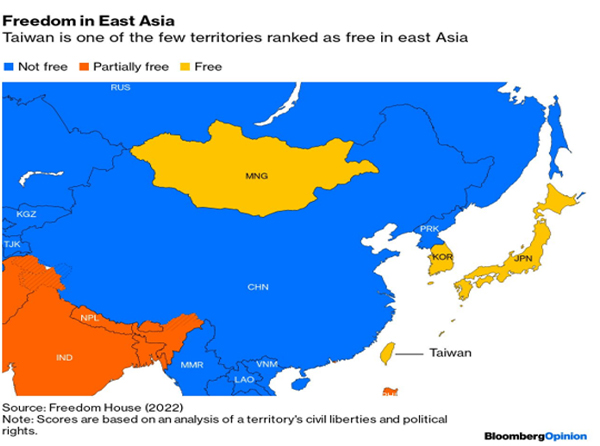
By Lara Williams
Nancy Pelosi’s short trip to Taiwan didn’t go unnoticed, it’s safe to say.
While the world watched the US House speaker meet with Taiwan President Tsai Ing-wen and pro-democracy activists, China’s reaction can only be described as furious. Saying “those who play with fire will perish by it,” the government responded with several days of intense military drills in the Taiwan Strait, then placed sanctions upon Pelosi and Taiwan.
The trip has been described as a “reckless gamble,” an “egregious provocation” and “not a good idea right now” by people in both the US and China (that last quote was US President Joe Biden’s), but Matthew Brooker has to hand it to Pelosi for nailing the optics. Explaining her reasoning in a Washington Post op-ed, she portrayed the self-ruled island as a model democracy and free society that’s increasingly menaced by its giant authoritarian neighbor.
That sounds somewhat familiar. But while Russia’s invasion of Ukraine has led to a potentially devastating energy crisis and critical shortage of food in some of the world’s most vulnerable nations, Niall Ferguson writes that a war over Taiwan may be even more disruptive to the global economy. It would, for example, threaten some of the world’s busiest shipping lanes as well as the production of one of our most precious commodities: computer chips.

One of China’s retaliations was to halt trade with Taiwan, suspending fish and fruit imports and banning sand exports to the island. But these bans are likely to have only a marginal impact on Taiwan’s economy. If China really wanted to cause some pain, it would have banned semiconductors from Taiwanese companies, notes Tim Culpan. The nation clearly needs TSMC’s semiconductors, too.
TSMC has been pretty good at being apolitical, saying things like “We are everybody’s foundry.” That’s not exactly the reality, however. For a variety of reasons — including former President Donald Trump’s sanctions on Huawei Technologies Co., a new Arizona factory and the US’s new multibillion-dollar Chips Act — TSMC is firmly on Team USA. That’s good for the company’s financial prospects, though it’ll likely have to learn how to deal with carrots and sticks from Beijing.
Of course, sanctions were not the only way China signaled its displeasure. It also launched a series of missile tests and three days of live-fire military exercises in the seas surrounding Taiwan, in what Minxin Pei describes as an “unprecedented escalation.” The goal was to illustrate how easily China could blockade Taiwan and cripple its export-dependent economy. It succeeded.

Optically, there are clear parallels between Russia’s invasion of Ukraine and a potential Chinese military campaign against Taiwan. As Russia’s military dwarfed Ukraine’s at the outset, so too does China’s over Taiwan’s:

The US is woefully ill-prepared to deal with China — so no wonder Biden was anxious about Pelosi’s trip. Hal Brands writes that American leaders from both parties have labeled China the supreme challenge of our era. But across many issues — trade, defense, diplomacy — the response has been uninspiring. Bloomberg’s editorial board writes that it’s now vital for the US to quietly shore up its deterrent capability and for Taiwan to adopt a “porcupine” defensive strategy.
Though Pelosi’s visit has shaken things up, tensions were already bubbling under the surface. To make matters more urgent, China’s economy is looking quite dire. Growth is rapidly decelerating, youth unemployment stands at a shocking 19.3%, and consumer confidence has plummeted. Any economy where widespread mortgage boycotts are happening isn’t a healthy one. Niall warns that this makes conflict all the more likely. Xi Jinping needs a source of legitimacy for his party, and economic growth no longer does the job
___________________________________________________________________
Lara Williams is a social media editor for Bloomberg Opinion. @lararhiannonw and writes is the Editor of Bloomberg Opinion Today Newsletter. Energiesnet.com does not necessarily share these views.
Editor’s Note: This article was originally published by Bloomberg, on July 29, 2022. All comments posted and published on EnergiesNet.com, do not reflect either for or against the opinion expressed in the comment as an endorsement of EnergiesNet.com or Petroleumworld.
Original articleUse Notice: This site contains copyrighted material the use of which has not always been specifically authorized by the copyright owner. We are making such material available in our efforts to advance understanding of issues of environmental and humanitarian significance. We believe this constitutes a ‘fair use’ of any such copyrighted material as provided for in section 107 of the US Copyright Law. In accordance with Title 17 U.S.C. Section 107. For more information go to: http://www.law.cornell.edu/uscode/17/107.shtml.
nergiesnet.com 08 08 2022












